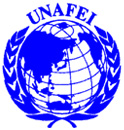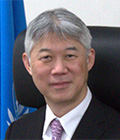United Nations Asia and Far East Institute for the Prevention of Crime and the Treatment of Offenders (UNAFEI)

What is UNAFEI ?

Yoshimitsu YAMAUCHI
The United Nations Asia and Far East Institute for the Prevention of Crime and the Treatment of Offenders (UNAFEI) was established in 1962 with the aim of promoting the sound development of criminal justice systems and mutual cooperation mainly in the Asia and Pacific Region. UNAFEI’s activities focus on training courses and seminars for personnel in crime prevention and criminal justice administration, and the research and study of crime prevention and the treatment of offenders.
Message From UNAFEI
As a member of the United Nations Crime Prevention and Criminal Justice Programme Network of Institutes (PNI), UNAFEI organizes training courses, seminars and workshops in the field of crime prevention and criminal justice. UNAFEI’s training programmes also cover the United Nations standards and norms on offender treatment, UN conventions and the Sustainable Development Goals for 2030 (SDGs) to promote the rule of law. Upon conducting the training programmes, UNAFEI actively collaborates with PNI members and the UNODC, inviting lecturers from those organizations.
UNAFEI’s main activities are two international training courses and one international senior seminar conducted annually, all of which last for about four weeks. The international training course in spring mainly focuses on issues of crime prevention, investigation and adjudication, while the one in autumn concentrates on the management of correctional facilities and rehabilitation of offenders. The international senior seminar in winter targets higher-level criminal justice officials and deals with broader issues of criminal justice. In addition, UNAFEI has held the “UNAFEI-UNCAC Training Programme” annually since 2000 for the purpose of studying the current situation of, and challenges in, the countermeasures to corruption.
In addition to the abovementioned international training courses and seminars, upon request from recipient countries around the world and the UN, UNAFEI provides technical assistance in the field of crime prevention, criminal justice and treatment of offenders. UNAFEI’s technical assistance projects include country-focused programmes, for instance training courses for those working for the prevention of delinquency and the treatment of juvenile delinquents in Kenya and regional programmes, for instance training programmes for South-East Asian Countries and French-speaking African countries.
Furthermore, since 2018, UNAFEI has provided technical assistance in collaboration with the UNODC’s Regional Office for Southeast Asia and the Pacific. Through the Joint Seminar with Timor-Leste on prison reform, technical assistance focusing on capacity building of correctional officers in Philippines and technical assistance on community-based treatment in Cambodia, UNAFEI has contributed to training and capacity building of personnel in the field of rehabilitation of offenders.
Over the past 60 years, more than 6,500 criminal justice practitioners from 144 countries/regions have participated in UNAFEI’s training courses and seminars. Many UNAFEI alumni members are playing leading roles in the field of criminal justice in their respective countries, thus strengthening the UNAFEI alumni network. Given the globalization of crime, networking among criminal justice practitioners and agencies facilitates sharing of experiences, gathering of information and international cooperation.
Contact
United Nations Asia and Far East Institute for the Prevention of Crime and the Treatment of Offenders (UNAFEI)
2-1-18, Mokuseinomori, Akishima-shi, Tokyo, 196-8570, Japan
Tel:+81-042-500-5100 / Fax:+81-042-500-5195
https://www.unafei.or.jp/english/index.html (English)
https://www.unafei.or.jp/english/about/director_E.html (Director’s message; English)
https://www.unafei.or.jp/index.html (Japanese)
https://www.unafei.or.jp/about/director_J.html (Director’s message; Japanese)


